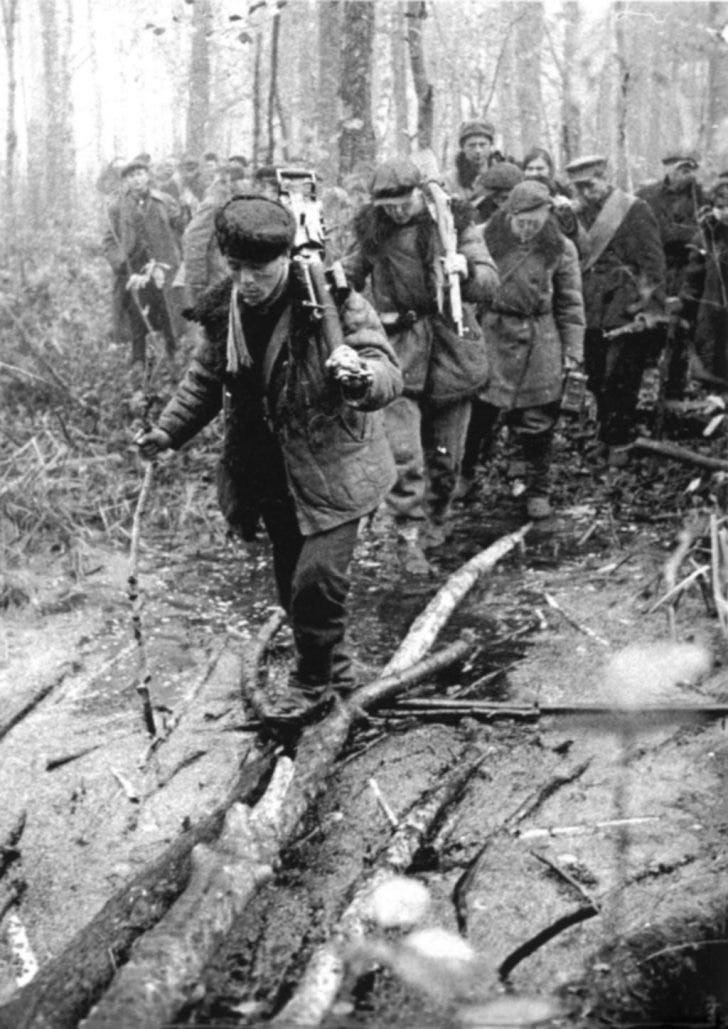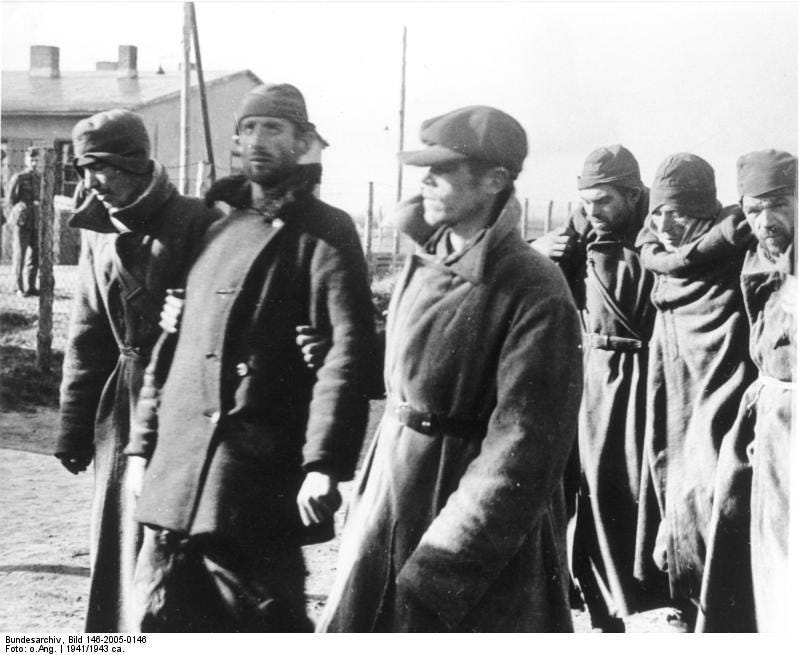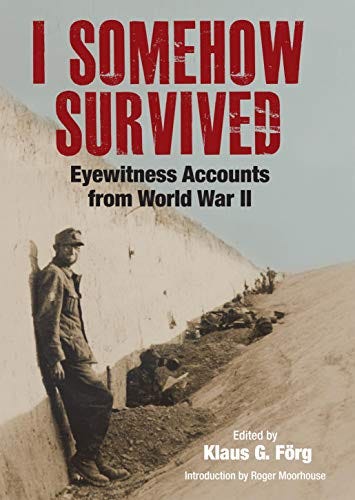'I Somehow Survived'
Eyewitness Accounts from World War II. Participating in German atrocities near Kiev ...
I Somehow Survived: Eyewitness Accounts from World War II is a new collection of German accounts of the experience of war. First published in Germany in 2019 it is based on interviews with veterans in Bavaria. These memories, recorded later in life, lack the precision of dates and locations that might be found in contemporary diaries and memoirs. On the other hand the distance in time has allowed some men the perspective, and perhaps honesty, that they might not have permitted themselves had they given these accounts just after the war,
The generation born in the early and mid 1920s were, almost without exception, condemned to participate in the most brutal of wars. There was no avoiding conscription and, once in the Army, no avoiding orders. More than one of these memoirs acknowledges that they became ‘murderers’. To some extent these men had been brutalised by seeing their own friends killed. Yet it was still ‘kill or be killed by your own side’.
The chapter from Georg Weiss: The Eastern Front - the Accursed War, the longest in the book, covers service on the Eastern front from 1942 to the end of the war. It was soon after he arrived on the front near Kiev in the Ukraine in late 1942 that he was involved in ‘anti-partisan operation’.
The reality of what Reichenau’s ‘Severity Order’ actually meant is all too apparent from the following passage:

[A]s the Red Army gradually began gaining in confidence, their people rose up to avenge murdered neighbours and family members, and to fight for their country. We simple soldiers bore the brunt of this, for we were in the front line to atone for the brutality of the occupying force. More and more German personnel were being attacked and killed, or crippled, and the revenge of the occupying troops was equally brutal and inhumane.
At random, or upon the slightest suspicion, people would be arrested, loaded aboard a lorry and transported to a roadside gallows for execution. After the sobbing victims had had the noose fastened around their necks the lorries would drive off. Often the corpses were left dangling on the gallows for weeks as a deterrent.
All this helped foment more hatred of us. The worst of it was that there was no prospect of a change for the better, or an end being put to the mutual carnage. Today I can hardly believe that we were able to go through so much horror without losing our sanity.
‘As a devout Catholic, throughout the war I could never understand how heaven could permit such atrocities to happen, or why the guardian angels of the victims never intervened to save these people. This kind of question had no answer. All we knew was that if we refused the order, the SS would arrive to carry it out and start off by shooting us’
Another barbaric crime in which I was forced to take part occurred in the following way. About five kilometres from our barracks on the eastern side of the river stood several Ukrainian villages. Nearby were large forests and between them swamps and meadowlands. These were precisely the conditions which best suited the partisans, who were presumably being given support by the people m the villages.
As a reprisal it was decided to raze these villages to the ground. Twice I was forced to take part in the Aktion .
We were 1,000 heavily armed troops. Five hundred crept up and encircled a village at dead of night while the others entered the dwellings and set fire to them, no heed being paid to pleas and protests under any circumstances. The occupants who attempted to flee were mercilessly gunned down. The cries, in particular those of the children, were terrible to hear.
As a devout Catholic, throughout the war I could never understand how heaven could permit such atrocities to happen, or why the guardian angels of the victims never intervened to save these people. This kind of question had no answer. All we knew was that if we refused the order, the SS would arrive to carry it out and start off by shooting us.
‘Only someone who has experienced such an operation can understand what fiendish inhumanity was at work here. For me it is impossible to forget such chaos and suffering.’
On the occasion of the second Aktion, I was given a part in the storming of a village. The small houses there were hardly worthy of the name, being no more than wretched huts with straw roofs. When I entered one I found the only occupant to be an old woman, skin and bones, shouting loudly and pitifully. I tried to get her to go outside but she seemed almost incapable of movement. Out of compassion, I took her arm and lifted her towards the door, against her will. She resisted and got free, tottering and staggering back into the dwelling, which by now was burning brightly. Other members of my unit had set it on fire some time before. Our orders were clear: 'Raze everything to the ground and exterminate the occupants.'
I felt a weight fall from my heart when I saw the old people and children being transported out on a lorry, but what happened to them afterwards I have no idea. At least they were not butchered at the village. Only someone who has experienced such an operation can understand what fiendish inhumanity was at work here. For me it is impossible to forget such chaos and suffering.
A couple of kilometres from our barracks was a camp for Russian prisoners of war. The inmates were of all ages, from schoolboys to grandfathers. Stalin had forced them all to take up arms against the invaders, and many had been captured and brought back to such camps, where most would have no chance of surviving.
Every day we recruits had to bring out eight prisoners and put them to work felling trees near our barracks. It was early winter with temperatures of -35° to -45°C. The prisoners were so debilitated and weakened by hunger that even on the walk to the barracks some would collapse during the first kilometre. On one occasion we reached the barracks with only two men of the original eight who had set out.
At the edge of our base was the kitchen. Near it was a rubbish heap of frozen potato peelings and stinking animal innards. The prisoners would fall upon it voraciously. These men were being deliberately starved to death.
The prison camp was surrounded by a barbed-wire fence as high as a house. The lower part of the fence had a supplementary electrified section. Now and again Russian prisoners died there by electrocution. In my opinion some of these chose suicide as a way out of their brutal treatment and the hopeless situation in which they found themselves. Stationed at twenty-metre intervals all around the camp were MG posts on a raised platform.
Inside the camp were two wooden huts with room for only a small number of the inmates. Urine and faeces flowed out from them. I had seen something similar in Bavaria: the alpine huts for cattle. The snow was frozen solid and the slop stank to high heaven. Most of the prisoners were dressed in rags, some of them barefoot. Once the field gendarmes brought to us eight men from the camp who counted as recent arrivals. They could still walk more or less but had no flesh on their bones.
On average every day, twenty to twenty-five prisoners died of starvation or froze to death in the camp. The survivors had to bring out the corpses and throw them into a nearby ravine. As often as possible I found some excuse to be absent when the hour for it came, I could hardly bear the sight. It was no prisoner of war camp but an institution for exterminating its inmates.

This excerpt from I Somehow Survived: Eyewitness Accounts from World War II appears by kind permission of the publisher, Pen & Sword Books Ltd, copyright remains with author. The above images are not from the book.


